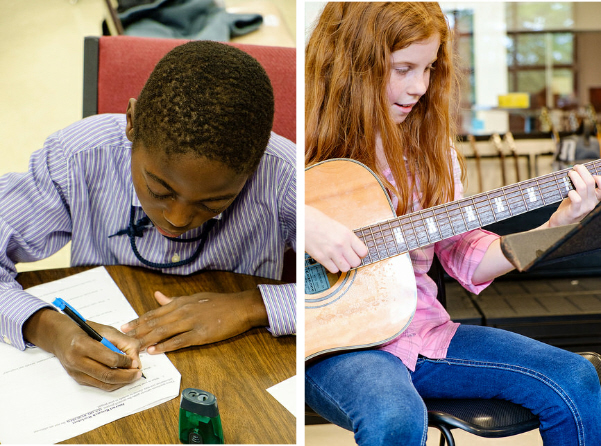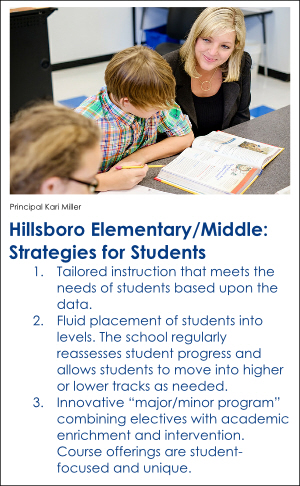No one is teaching to the middle at Hillsboro Elementary/Middle School, winner of the 2014 middle school SCORE Prize.
Core academic courses are levelled – in each middle school grade, as many as five different levels of rigor are offered in separate classes. A flexible, creative master schedule provides extra time for students needing subject area help, while making available a diverse array of related arts courses ranging from yoga to theater makeup. Placements are fluid, not permanent, and revised quarterly.
“We have a philosophy to meet every child where they are in every subject and every standard,” said Principal Kari Miller. “We manipulate our schedule around the needs of kids.”
 Highly differentiated instruction, as well as arts integration, has delivered outstanding academic progress for the school in Leiper’s Fork. Hillsboro students score well above statewide averages on TCAP assessments, and the school posts strong three-year marks on TVAAS growth, particularly in math.
Highly differentiated instruction, as well as arts integration, has delivered outstanding academic progress for the school in Leiper’s Fork. Hillsboro students score well above statewide averages on TCAP assessments, and the school posts strong three-year marks on TVAAS growth, particularly in math.
In addition, Hillsboro has done significant work to narrow achievement gaps. The gap between economically disadvantaged students and their more affluent peers has narrowed across all subjects. Hillsboro is a Title I school, and serves a growing population of economically disadvantaged students. Hillsboro, part of Williamson County Schools, serves about 300 students in grades 6-8, in addition to kids in grades K-5.
The introduction of levelled academic courses several years ago played a major role in Hillsboro’s strong academic performance. There are different numbers of levels in different grades, depending on student number and need, but five levels is typical. The different levels are referred to by the names of Ivy League colleges, like Oxford, Yale and Brown. Class sizes are smaller at lower levels.
Academic data guides the formation of the levels, delivering the right amount of rigor for each student. Scheduling also accommodates students needing placements in different levels for different subjects. With this broad levelling in place, differentiation within classrooms becomes a matter of fine-tuning.
Students receive their schedules and locker assignments at an ice cream social the day before each new school year begins. Level placements are reconsidered about a month into the school year, after first assessments, and parents are invited to school at that time to review data points and understand placement rationale. Chris MacDonald, an English/Language Arts teacher who helps create the schedules, said most parents are happy with the process. The few complaints usually stem from social concerns.
“It’s never about intelligence. It’s about missing skills,” said Mr. MacDonald. “Once they see we really have their kids’ best interests in mind, they are happy. We have a high rate of success.”
Hillsboro provides another dimension of creative scheduling through its intervention and arts offerings. Students choose between several options called “Majors,” including band, choir, visual arts, and theater. Another block is devoted to either enrichment or academic intervention. Intervention is based on student needs, and delivers extra time for subject area help and work with learning coaches. Enrichment is delivered through “Minors,” a diverse array of courses offered on a quarterly basis.
 This format allows the school to offer a highly unusual, diverse array of learning opportunities. Students meet – and often choose to exceed – state requirements for computer and physical education, with options for advanced computer work and interest-based PE classes like Zumba. Kids in a “Build” class construct catapults from donated materials, and a “Future Teachers” class gives middle schoolers the opportunity to consider a career in education and interact with K-3 classrooms.
This format allows the school to offer a highly unusual, diverse array of learning opportunities. Students meet – and often choose to exceed – state requirements for computer and physical education, with options for advanced computer work and interest-based PE classes like Zumba. Kids in a “Build” class construct catapults from donated materials, and a “Future Teachers” class gives middle schoolers the opportunity to consider a career in education and interact with K-3 classrooms.
“Middle school is a time to try something you may be a little bit scared of,” said K-8 Arts Team Leader Elizabeth Pittsley, who schedules the Minors options. “It’s not a big commitment. It’s nine weeks. We try to encourage them to try new things.”
Scheduling all this is no small task. School staff take multiple perspectives on each child as they consider the intervention/enrichment block. Academic data and formative assessments are core considerations. Input is gathered from teachers and literacy coaches.
An incentive for students is built into the process – less time required for intervention means more time for electives. And when students need all the intervention time the school can offer, teachers and literacy coaches still work to find a way to fit in both needed interventions and brain-expanding electives.
“Some kids come to school for those elective classes,” Ms. Pittsley said. “Middle school is when you’re figuring out who you are, and it’s the first time you’re making some of your own choices. It empowers them to take charge of their education.”
Creating this system involves more than making a schedule. Buy-in is essential, from everyone involved. When the diverse array of Minor classes was first offered, there were already staff members at the school who wanted to teach more arts and physical education classes. Teachers are extended a measure of freedom in what they choose to offer. This invigorates the teachers, which in turn spreads to the students. Funding is also crucial. If a promising class involves teaching classic strategy techniques through board games, or requires special cosmetics for a theater make-up class, it’s important to have a budget in place.
Building student schedules at Hillsboro is a time-consuming process. No computer program can handle the many inputs determining appropriate academic level placements or best use of intervention and enrichment time. But the pay-off is huge, delivering a holistic, individualized experience for students.
Hunter Jones, an eighth-grader who is about to move on to high school after nine years at Hillsboro, can vouch for the interplay between rigorous academic courses and related arts. In Hunter’s case, the discipline and dedication required by band performance taught him how to work hard in other classes. He feels well prepared for high school, and has already earned a high school credit from his work in an elective “Minor” class he took – Spanish.
“It’s something special and different from your average school,” Hunter said.
Learn more about Hillsboro’s work to improve academic achievement in this SCORE Prize video.
